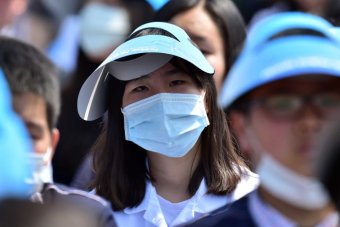The number of infections rose to 64 after 14 new cases, including one death, of Middle East Respiratory Syndrome (MERS) were confirmed on Saturday night, the health ministry said.
The MERS outbreak, the biggest outside the Middle East, was first reported in South Korea on May 20.
The latest victim, the fifth to die, was a 75-year-old man who was in the same Seoul hospital emergency room where a total of 17 people, including two staff, are believed to have been infected throughout the outbreak, South Korea’s health ministry said.
Of the 14 new cases, 10 were at the same Seoul hospital, and all new infections were among people already in quarantine after being exposed to those diagnosed earlier.
However, Busan city authorities have reported an additional case in the country’s southern port and second-largest city, sparking alarm that the outbreak may spread nationwide.
The case was not included among the 14 new infections confirmed by the health ministry.
Acting prime minister Choi Kyung-Hwan said the government will step up monitoring on those placed under observation, including tracking the locations of those in quarantine at home via their mobile phones.
“Please understand that it is an inevitable measure to ensure the safety of your neighbours and families,” he said.
Mr Choi has now disclosed the list of 24 hospitals where patients were diagnosed or treated, mostly in Seoul or Gyeongi province surrounding the capital, saying it was aimed at “easing public anxiety.”
He urged the public not to panic, saying all 64 patients had already been in hospital.
“We can put the situation under control because… the outbreak is not spreading to the outside community,” Mr Choi told a press conference.
“People should not overreact and should cooperate closely (with the government) to minimise negative impact on the economy.”
Samsung Medical Centre in Seoul, one of the 24 hospitals, and where 17 cases were confirmed, said over 890 patients and medical staff had been exposed to those infected.
“We notified the 893 people immediately and carried out necessary quarantine measures,” the hospital president Song Jae-Hoon told reporters.
Seoul city mayor Park Won-Soon has warned of the potential danger of the outbreak at the hospital, one of the country’s largest, visited by more than 8,000 patients a day.
“We are afraid that there is a significant possibility that the outbreak at the Samsung hospital could spread to the local community,” Mr Park said.
The Seoul education council has also ordered the closure of all 126 kindergartens and primary schools in Gangnam and Seocho districts in southern Seoul, where the Samsung hospital is located.
With the number of new cases growing on a daily basis and public fear rising, more than 1,300 schools have been closed temporarily.
Public events and sports games were cancelled across the country.
More than 20,000 foreign travellers have cancelled planned tours, Seoul’s tourism board said.
First identified in humans in 2012, MERS is caused by a coronavirus from the same family as the one that triggered Severe Acute Respiratory Syndrome (SARS).
But MERS has a much higher death rate at 38 per cent, according to World Health Organisation figures.
The South Korean MERS outbreak has been traced to a man who returned from a business trip to the Middle East.
His wife, who was also infected, has recovered and became the first in the outbreak to be discharged from the hospital, officials announced.
There has been no sustained human-to-human transmission, but the worst-case scenario is the virus changes and spreads rapidly, as SARS did in 2002-03 when it killed about 800 people around the world.
AFP
MERS facts
- Middle East Respiratory Syndrome Coronavirus is known as MERS and MERS-CoV
- All recorded cases can be traced back to the Middle East
- Dromedary camels are thought to be the source of infection
- The virus can be spread person-to-person
- Symptoms include fever, cough, shortness of breath and breathing difficulties
- Severe cases can have a rapid onset of respiratory illness, like pneumonia
- There is no vaccine to prevent the virus
Source: health.gov.au

